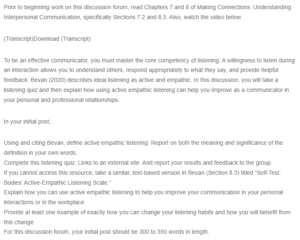Empathic Listening Skills
Defining Active Empathetic Listening
According to Bevan (2020), active empathetic listening (EAL) is a way of communicating empathetically, where a listener is focused and emotionally engaged in an interaction or conversation. Both the speaker and the listener must be conscious of the listener’s involvement in the conversation. For effective active listening, the listener must pay attention to the speaker’s non-verbal cues. Also, the listener should actively participate in the interaction by asking questions, clarifying points made by the speaker, and non-verbally indicating that they have understood the message being communicated (Clawson, 2006). It is easy for a speaker to determine that a listener is not actively engaged in communication, especially if they keep asking the speaker to repeat what they have just said.
Self-Assessment
Based on the active, empathetic listening assessment scale, I scored highly on a few aspects. For instance, I tend to pay attention to what others imply but do not speak. I also had a high score regarding an understanding of what others say. On the other hand, I scored low in assuring others that I am listening to them through non-verbal cues. Having undergone the assessment, I realized that I rarely reassure others that I am listening to them through non-verbal cues; hence, I need to improve on that. Even if someone else were to take the assessment for me, they would still get similar outcomes.
Applying Active Listening at the Workplace
Active listening in the workplace facilitates team collaboration (Duwadi, 2014). Whereas individual brilliance is essential, if one cannot collaborate with other employees, their abilities may not be that useful at the organizational level. Listening has particularly become important in the Internet age, where there are multiple communication platforms apart from traditional one-on-one meetings. Notably, top organizational managers need to exhibit active listening skills to convince employees that they are useful to the organization.
Improving My Active Listening Skills
Based on the above, I can improve my active listening skills. One of my significant weak points during conversations has been not observing proper turn-taking. Often, I interrupt speakers to prove that I have understood their point. However, having understood the importance of active listening, I will have to improve my turn-taking decisions. Improving turn-taking skills and avoiding interrupting other parties while communicating will go a long way to assure the speaker that they are respected (Jassouma, 2021). Besides, constantly interrupting speakers makes them feel disrespected and misunderstood. I will also improve my active listening skills by using non-verbal cues like nodding.
References
Bevan, J. L. (2020). Making Connections: Understanding Interpersonal Communication (3rd ed.). [Electronic version].
Clawson, J. G. (2006). Active Listening. SSRN Electronic Journal. https://doi.org/10.2139/ssrn.910376.
Duwadi, E. P. (2014). Listening skills for communicating effectively in teams. International Journal of Communication, 24(1).
Jassouma, M. (2021). Turn-taking in Oral Communication. https://doi.org/10.13140/RG.2.2.34403.78881.
ORDER A PLAGIARISM-FREE PAPER HERE
We’ll write everything from scratch
Question
Prior to beginning work on this discussion forum, read Chapters 7 and 8 of Making Connections: Understanding Interpersonal Communication, specifically Sections 7.2 and 8.3. Also, watch the video below.

Empathic Listening Skills
(Transcript)Download (Transcript)
To be an effective communicator, you must master the core competency of listening. A willingness to listen during an interaction allows you to understand others, respond appropriately to what they say, and provide helpful feedback. Bevan (2020) describes ideal listening as active and empathic. In this discussion, you will take a listening quiz and then explain how using active empathic listening can help you improve as a communicator in your personal and professional relationships.
In your initial post,
Using and citing Bevan, define active empathic listening. Report on both the meaning and significance of the definition in your own words.
Complete this listening quiz. Links to an external site. And report your results and feedback to the group.
If you cannot access this resource, take a similar, text-based version in Bevan (Section 8.3) titled “Self-Test: Bodies’ Active-Empathic Listening Scale.”
Explain how you can use active empathic listening to help you improve your communication in your personal interactions or in the workplace.
Provide at least one example of exactly how you can change your listening habits and how you will benefit from this change.
For this discussion forum, your initial post should be 300 to 350 words in length.

